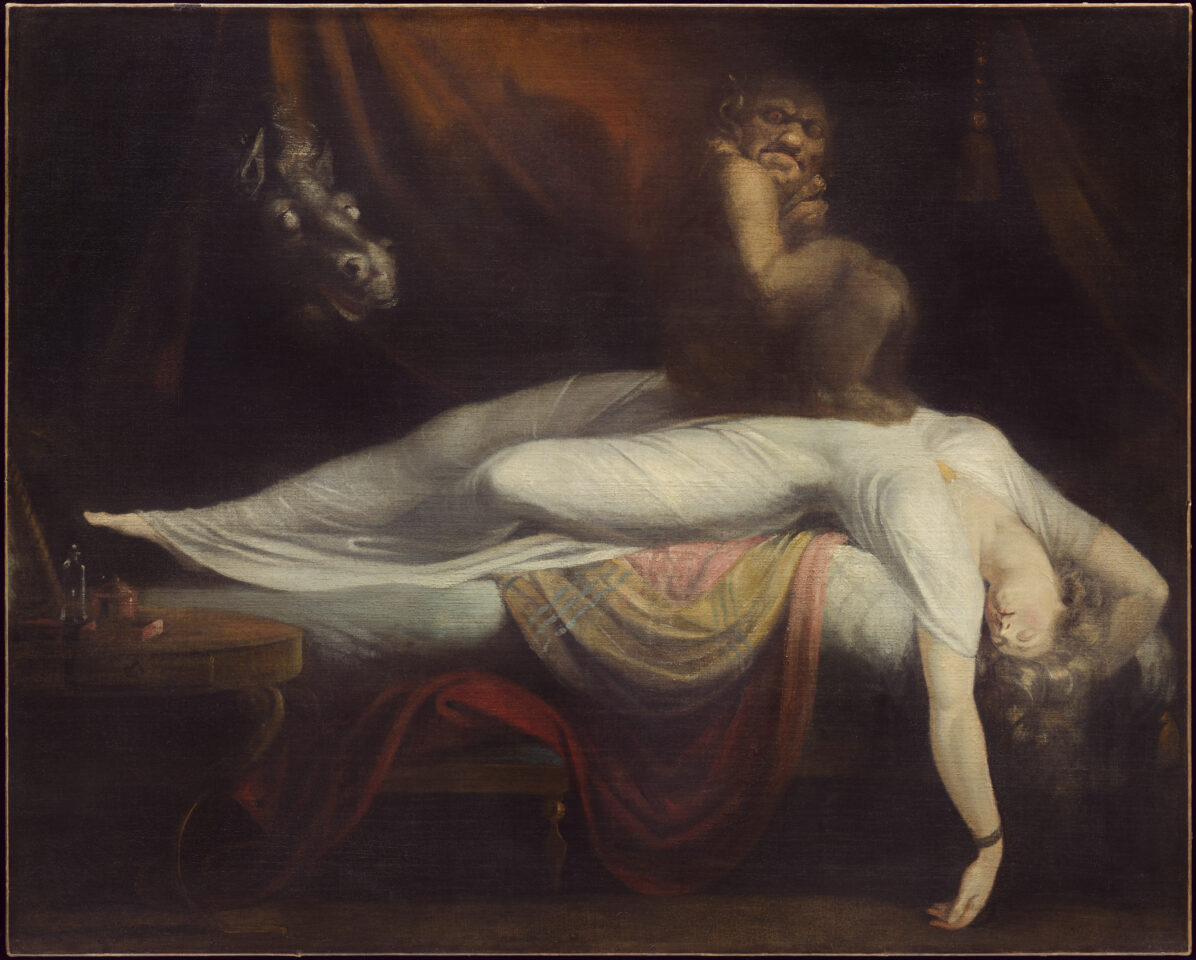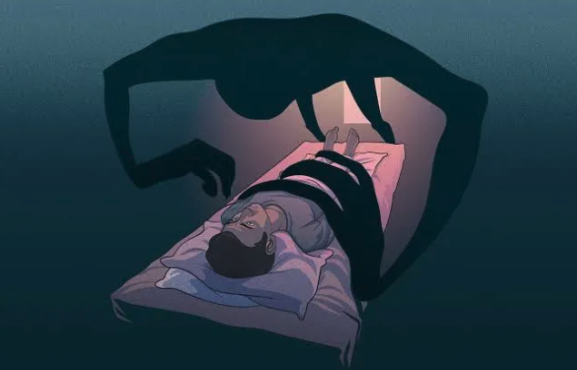As a sleep researcher, I am fascinated by growing evidence in various species on the coexistence of sleep and wakefulness – that our brains can possess hybrid states rather than globally sleeping or awake. It challenges the commonly held notion that sleep is a global phenomenon. These local brain islands can be beneficial in some cases, but at other times can be a cause of terrifying emotional distress.
“I remember having a sleep paralysis episode where my eyes were open and I was having strange hallucinations. It is really hard to describe,” said Brenda, who has had sleep paralysis for as long as she can remember.
I knew I was in my bed, but I was receiving some messages without sensing or hearing them – like telepathy. I had visions without seeing anything and heard messages without sound. I felt as if ‘they’ were mocking me. It’s not from a single entity or several people, but it was a whole ‘thing’ [a presence]. It is hard to explain. I receive messages like ‘you look so vulnerable right now, and you won’t get out of this as easily as you think.
While hallucinating, Brenda is stuck – her muscles are, her mind is not. “I’m just trying to fight for my life,” she said. “While I’m receiving these messages, I’m trying to be strong and find ways to get out, wake up, but I cannot. And when I try to fight back, I feel the sensation of ‘sleepy leg’, like a lot of ants crawling all over my body.”
Brenda was unable to move because her muscles involved in voluntary movement were paralyzed. This is called muscle atonia, which occurs during the Rapid Eye Movement (REM) stage of sleep, when most vivid dreams occur. This mechanism prevents us from enacting our dreams and waking up. However, during a sleep paralysis episode, muscle atonia persists during wakefulness, i.e. the rest of the body stays in a REM-like state.
During the mixed state of sleep and wakefulness, many individuals like Brenda experience hallucinations from which they cannot escape. Common hallucinations include ‘intruder hallucinations’ (sense of evil presence in the room), ‘incubus hallucinations’ (pressure on chest as if you are being choked or suffocated) or ‘vestibular-motor hallucinations’ where you sense movement in and out of your body. Sleep paralysis can occur while falling asleep or waking up.

Although sleep paralysis can co-occur with other medical conditions like narcolepsy, or with other sleep disorders, neurological or psychiatric conditions, stress, substance use, etc., Brenda has no underlying medical condition which can trigger or explain recurrent sleep paralysis. This type of sleep paralysis is called recurrent isolated sleep paralysis.
For Brenda, these episodes occur as she falls asleep, lasting from a few seconds to ten minutes, which feels like an eternity. “The episodes are kind of blurry,” she said. “I’m aware that everything is happening, but at the same time, it is unclear.” The experience itself may be hazy, but what she clearly remembers is the extreme tiredness that follows from fighting to escape from it.
If she immediately drifts back to sleep, she falls into another sleep paralysis episode. “To break the cycle, it takes me inhumane willpower to get out of bed, drink water or do something before trying to sleep again. If I immediately fall asleep, it can happen five times in a single night. Even in the mornings, when I wake up to use the bathroom and try to fall back asleep, I experience another episode,” Brenda explained.
Brenda has had sleep paralysis since her childhood. Hallucinations and the fear of being trapped have caused some anxiety about sleeping. “I don’t like to sleep alone because it stresses me out to be in a vulnerable situation, needing to get out of sleep paralysis and not having anybody next to me who can help me or calm me down or wake me up.”
The occurrence of sleep paralysis is unpredictable. Since last year, Brenda hasn’t had any episodes, and overall, their frequency has decreased since her teenage years. “It stops for many months and then comes back,” she said. “Sometimes I will have it every night for a week, and then it will just go away for another six months and then for another year.” She has accepted that sleep paralysis will be a part of her life. “It always comes back. I have no reason to believe that it will never happen again. It has happened my whole life.”
Brenda does not discuss sleep paralysis with others, with a fear of being called ‘weird’ or ‘crazy’. “I thought that if I didn’t think about it too much, it would go away. A part of me was also scared that people would think I was weird or crazy because it is hard to explain. Growing up, my family thought that I was having nightmares, and I was convinced that my brain was playing tricks on me.”

GAINING CONTROL
Over the years, Brenda has experimented with various strategies to reduce the occurrence of sleep paralysis and to regain voluntary control when an episode strikes.
Having a bed partner helps Brenda. “I can’t scream during the experience, but I can make certain sounds, and my wife can hear me. She can shake me out of it. Just a tap on my shoulder doesn’t work.” But when she sleeps alone, “I feel a bit nervous about going to bed, and I try to either read or be on my phone until I’m just so tired that I can’t do anything but fall asleep.”
Moreover, Brenda minimizes the risks of sleep paralysis by regularly exercising, meditating, managing her stress, etc., but that hasn’t comforted her much. She added, “During the episode, the self-talk, such as ‘it’s okay, it will pass, you’ve been through this so many times’, and just relaxing or falling back asleep does not help me.
She tried lucid dreaming, having known that it had helped some people with sleep paralysis. But she would get scared for the dream to turn into a nightmare or paralysis, and “just the doubt and fear was enough for my lucid dream to slip into sleep paralysis. I am scared to get scared with the possibility of triggering sleep paralysis.” Fear is very powerful that way.
Finally, Brenda discovered that finding some control over her body helps in one way or another. She said,
My breathing can get me out of this state or make it more manageable. I can still control it while in a state of sleep paralysis. Since I can’t move or scream, I try to breathe very hard, try to feel the movement of my lungs.
A NEED FOR CHANGE
- Beat stigma through normalization and education: Brenda shared that there is stigma around sleep paralysis. “When I share it with some people, they look weird at me and say that ‘it’s weird’ or ‘it’s not normal’. I didn’t like to have those comments. So, I prefer not to say much, not to share.”
Throughout our conversation, Brenda often said “It’s really hard to explain” or “I don’t have words”. Lack of vocabulary can stem from a lack of representation and understanding of the experience. Without accessible language, many, although not Brenda, try to find non-medical explanations. Across cultures, sleep paralysis has been associated with many supernatural beliefs, such as nocturnal alien abductions and demonic attacks or paranormal connections, which in turn might hold back someone coming out and seeking help or identifying other underlying conditions.
- Increase research: More research is needed to understand sleep paralysis, develop effective treatments and coping strategies, and implement routine assessments of underlying medical conditions which can cause it.
Although Brenda does not experience frightening visual hallucinations, such hallucinations are common and can be highly distressing, affecting the rest of one’s day and creating significant anxiety about sleeping when episodes recur.“There is not much scientific information out there.” Research on why sleep paralysis occurs, how it relates to associated medical conditions and which treatments can work is important.
While sleep paralysis is not typically dangerous to health, it can cause tremendous emotional distress compounded by difficulty sharing it and being taken seriously as a real medical condition without facing ridicule.
Despite rarely talking about it, Brenda wanted to share her experience to help others feel seen.
I wanted to share my story so that it can help other people

Madhura Lotlikar, Ph.D. candidate, Neuroscience, McGill University
